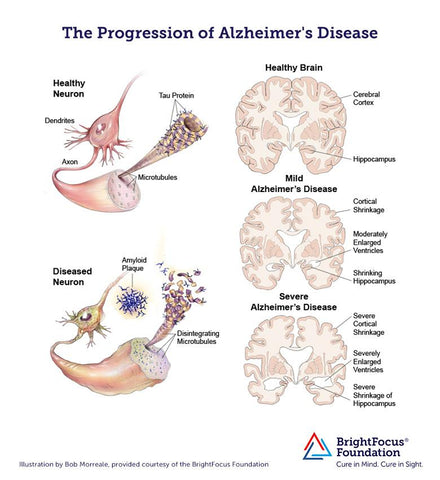on US orders over $100
on all US orders over $100

World Alzheimer's Day, celebrated yearly on September 21st, spotlights a disease that affects over 5 million Americans. Alzheimer's Disease diagnoses are growing at an exponential rate, and treating it is one of the costliest efforts in our health care system. Early detection not only improves quality of life, but also can massively reduce the costs associated with treating Alzheimer's Disease.

Alzheimer's Disease is a type of dementia that causes problems with memory, thinking, and behavior that impede daily functioning. It accounts for 60 to 80 percent of all dementia cases, and its rates are steadily increasing:
While some memory impairment is part of the normal aging process, Alzheimer's is not. Incidence rates increase with age, and while the majority of people with this disease are age 65 and older, its impact is disproportionate, especially on those who have it, as well as their loved ones and caregivers:

In the early stages of Alzheimer's Disease, a person may still be able to function independently, able to drive, work, and be a part of social events and activities. The person may feel as though they are having memory lapses, including symptoms like:
Although the onset of Alzheimer's Disease cannot yet be stopped or reversed, an early diagnosis allows the person to have an opportunity to live well with the disease for as long as possible, and to plan for the future.

Typically the longest stage, this can last for many years and will require a greater level of care and assistance performing everyday tasks, such as: paying bills, cooking, or driving, but they still may remember important details about their life. Symptoms in this stage will be noticeable, and include:

The final stage of this disease can be difficult to witness, as individuals may need around the clock care and assistance. Patients may lose the ability to respond to their environment, carry on a conversation, and control movement. As memory and cognitive skills continue to worsen, individuals experience significant personality changes. Symptoms in this stage include:
Late-stage care decisions can be emotionally, financially, and physically demanding for the individual and the caregiver. If you or a loved one are experiencing any of the stages of Alzheimer's, there is help. Your local Alzheimer's Association chapter will connect you with all of the resources that you need to cope with the challenges and symptoms of this disease.
Need respiratory products to improve your breathing quality and make life more comfortable? Visit Mountainside Medical Equipment! We've got the best in quality respiratory products including everything from nebulizers to PEP therapy devices. Click this link to visit our asthma product collection!
Please consult your doctor or other qualified medical professional before stopping or starting any medications, supplements, or health regimens.
Leave a comment